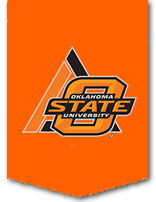Bar-S donates added technology to FAPC
(STILLWATER, Okla. - Aug. 25, 2005) – Made in Oklahoma is more than a phrase heard on commercials or seen in the grocery stores; it’s the lifeblood for the state. The agricultural industry in Oklahoma is about technology, and companies with value-added products have continued to bring about prosperity and add jobs to Oklahoma towns and communities.
One of Oklahoma’s most prominent ‘made in Oklahoma’ companies is Bar-S Foods.
Bar-S has been a partner with the value-added vision of the Food & Agricultural Products Center at Oklahoma State University since the center opened in 1997, and Bar-S is continuing to help the FAPC add value to Oklahoma products.
Bar-S recently donated a RT-7, which is a sausage filling and linking machine.
Jake Nelson, FAPC meat processing manager, said the newly donated piece of equipment can be used for any project that requires the stuffing and linking of emulsified sausages.
Even before the FAPC was created, Nelson worked with Rasool Rabbani, Bar-S Division Vice President for Co-Pack Operations & Technical Services, through the OSU Department of Animal Science.
"And now, with the value-added ability of the FAPC, Bar-S has come to us for help and assistance in developing their new products," Nelson said.
Bar-S ranks among the top 40 largest meat-processing companies in the United States. The company markets more than 100 processed meat products under brands such as Bar-S, Extra Lean, President's Pride, Chuck Wagon and others.
The Bar-S headquarters is located in Phoenix, Ariz., but the three Oklahoma production plants are located in Clinton, Altus and Lawton and one central distribution and service center is located in Elk City. The facilities are equipped with state-of-the-art equipment and rank among the cleanest, most modern and efficient operation in the industry.
Rabbani and Bar-S donated the machine as a result of the FAPC assisting Bar-S with product development work.
"As a partner of the FAPC, Bar-S would like to continue to help the FAPC add value to Oklahoma-made products," Rabbani said. "Bar-S likes to help upgrade the FAPC's equipment, so the center can assist Oklahoma processors in producing high quality products."
The idea of Bar-S donating the machine came about when Nelson and Dave Moe, FAPC pilot plant manager, were working with Rabbani on a project. Nelson made the comment that it would be nice to have a RT-7 in the FAPC.
"It just so happened that Bar-S was going through a plant remodel, and they were buying all new linkers," Nelson said. "Rasool told us that he would check into getting a machine for the FAPC."
The Bar-S facility in Altus had eight RT-7 machines that were being removed from the plant. Rabbani was successful in his effort to get the FAPC a RT-7, and the piece of equipment was donated by Bar-S in March.
"We would like the products made at the FAPC for Bar-S to be comparable with what we are making at our plants," Rabbani said. "Also, Bar-S would like for the FAPC to update its equipment because center employees can do their job more efficient."
Moe said having this machine will give the FAPC more opportunity to help companies such as Bar-S.
"When testing for Bar-S, we can be more representative on the plant conditions due to having this machine.” Moe said. “They might have parameters on stuffing that they want tested, and now we can do that.”
Moe also said the machine can be used as a tool for future short courses or sausage training.
“Having this piece of equipment is important because we can use it to showcase and demonstrate how the meat industry operates and works,” Moe said. “There are some people who may have never seen an operation like this, so this gives us an opportunity to showcase sausage processing."
The FAPC develops relationships with companies to help add value to Oklahoma products and keep the products, jobs and money in the state.
“We were very fortunate to receive the RT-7 machine,” Nelson said. "We have a good working relationship with Bar-S, and just a good relationship in general.”
###
Oklahoma State University, U.S. Department of Agriculture, State and Local Governments Cooperating. The Oklahoma Cooperative Extension Service offers its programs to all eligible persons regardless of race, color, national origin, religion, sex, age, disability, or status as a veteran, and is an equal opportunity employer.

